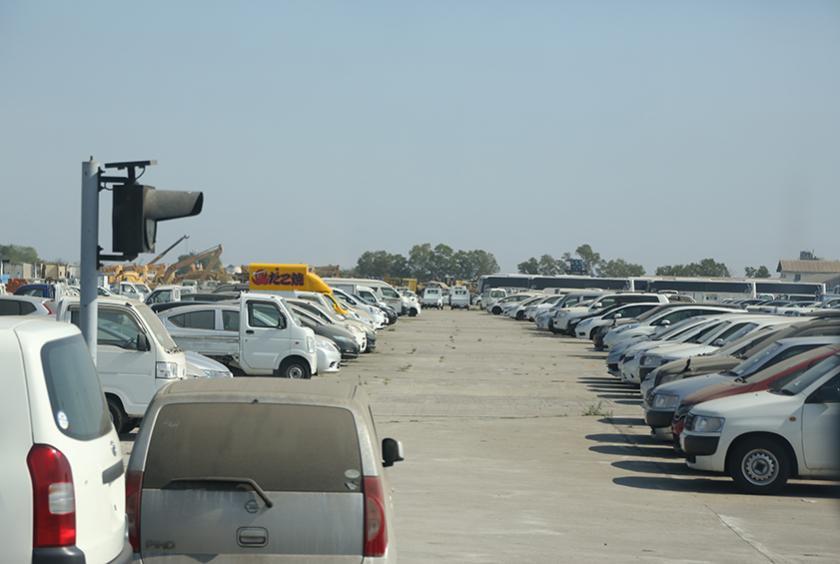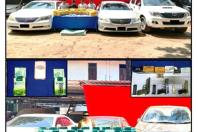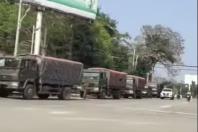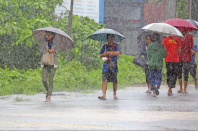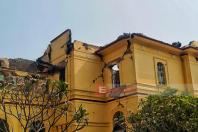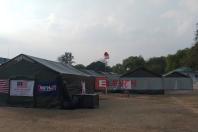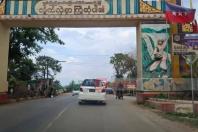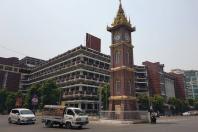During the fourth year of National League of Democracy (NLD) administration, an order regarding motor vehicle permits was issued in the beginning of 2020.
The order, according to the Ministry of Commerce, allows special privileges for civil servants to import cars, specifically during the first phase for the level of not lower than director-general or deputy director-general as well as in second phase those that had served for 25 years and have received awards recognizing them as an exemplary government staff.
Those eligible will be allowed to import as per a yearly list produced by the commerce ministry for vehicle imports.
Those looking to import vehicles will fill in and submit their personal and financial details as well as the type, manufacturing date and CIF (USD) of the vehicles. All applicants, at a minimum level already stated above, must go through the application process with the commerce ministry.
The current deadline for the process is on January 8 where before the due date, eligible applicants must send in the applications along with a letter of approval from at least someone holding a Director position in a department along with approval from a Permanent Secretary from that department in question as well as the state/regional government.
This had already fired up a storm of criticism from the public.
Thein Sein administration's “Peace Permits”
Myanmar has seen a similar order during the previous government led by President Thein Sein; the special permits allowed to ethnic armed forces that was largely implemented by the then Minister for the President’s Office Aung Min.
The permits, which allows license plate numbers starting with 9E/---, paved the way for many imported cars to appear on the market.
This is because despite the supposed intention of allowing the ethnic armed forces to allow import of their own vehicles, it was a permit that could be sold to any buyer easily as those permits were not specifically reserved for certain organizations or groups but effortlessly changeable to whichever the buyer’s name was.
And so many, through multiple agents in between, had imported numerous cars worth at least 100 thousand USD to 500 thousand USD.
According to the tax rates in 2014, a Rolls-Royce worth around 500 thousand dollars will cost in taxes Ks 850 million, bringing the total rate of such a vehicle after taxes to around Ks 1.3 billion.
As the “Peace Permits” allowed for circumvention of said taxes depending on the permit types, the import of a Rolls-Royce through such permits will mean that Ks 850 million went unpaid.
During that time, such permits were sold and cost between Ks 50 million and Ks 150 million. The price difference is due to the fact that the permits came in two types that one would rebate the holder of such permits 60 percent of taxes while the other kind would be able to avoid taxes entirely.
Aung Min himself officially declared that under those permits, a total of 1100 vehicles were imported into Myanmar with 370 vehicles using totally tax-free permits while 740 were from 60 percent tax-cut permits.
Despite the aim of allowing certain privileges for ethnic armed forces, those that really profited off those permits were the cronies, rich parliamentarians and businessmen that acted as agents in between those parties. It also cost the country billions of Kyats in taxes.
In comparison with one of the richest and most developed countries in the region, Thailand is thought to have less ultra-luxurious cars such as Rolls-Royce Phantom, Ferraris and Lamborghini than hundreds of those that many of the cronies managed to store in the garages as a result of those permits.
A Rolls-Royce Phantom, with the then market price of around 500 thousand dollars, will have cost the government in taxes around Ks 800 million if the permit allows total tax exemption.
A 300 thousand dollar Bentley will be around Ks 500 million in taxes while Lamborghini vehicles that ranges from thousands to millions of dollars will be Ks 500 million and above in taxes.
How will the NLD permits fare?
As of the information available now, it can be concluded that while there certainly are those that will rightfully benefit from those permits, there are also chances that those permits will go to cronies and those that cannot ascertain their method of income.
In order to obtain a license, Yangon Region is the most expensive and car imports have been temporarily halted. Those permits will eventually and surely make their way into the motorvehicle market as well as high likelihood that the NLD era permits will fetch more price than those of Thein Sein’s era.
Those that are eligible, as proven previously, for the permits are more likely to resell those permits rather than actually using them to purchase a vehicle which will eventually be scooped up money launderers.
At a time when the government is trying to enforce taxation and its regulations, these permits are detrimental to those efforts on top of losing out on taxes.
In recent days, the dollar as a currency has dropped in value against the Kyat. As a result of the permits, this value will climb back up.
The most pressing matters is money laundering. In Myanmar, there exists a multitude of ways that one can earn ‘black’ income such as drug trafficking and other professions that are not enforced by taxes. Such permits are golden opportunities for those people to officiate their money into ‘white’.
While road transport authority had made recent changes to ensure that all vehicles are securely registered under individual ownership, taxes to be paid at the port and other places will go uncollected. In large amounts, this will surely affect the country’s economy as a whole.
Since such are the risks, it must be handled with extant laws enacted against money laundering.
Is it truly legal?
Legal experts, lawyers and political observers have remarked that this move by the NLD is not in-line with the law.
“There are tax laws and it is something everyone must adhere to. So to exempt and overrule tax law is going against the law. The law states every citizen must pay their taxes but as everyone knows, we’ve had many governments that had given special privileges that were above the law. That tradition cannot repeat. This country must see rule of law. If the law states that every citizen must pay this amount of tax for this item, it must be so,” said Nyo Nyo Thin, an ex-MP.
She goes onto say that are other ways that are in-line with the law that assistance can be provided to civil servants.
“Things like exemptions by the president or ministers are methods practiced by a one-party authoritarian system and the military government. If they want to help a director-general, then do it so in other ways because the tax laws include all.”
In order for such special assitance to appear, it must be done so through legislation. A bill must be passed and before that it must be discussed thorogouly at the parliament.
“If they wanted to pass special laws for tax exemptions, they can do so. For example, to what amount of income earners will the special law be for? Or will it be depending on the years of service? All of this must be discussed and debated first before going through with tax relief or exemptions,” sid Nyo Nyo Thin.
Can director-generals and other civil servants actually make use of the NLD permits?
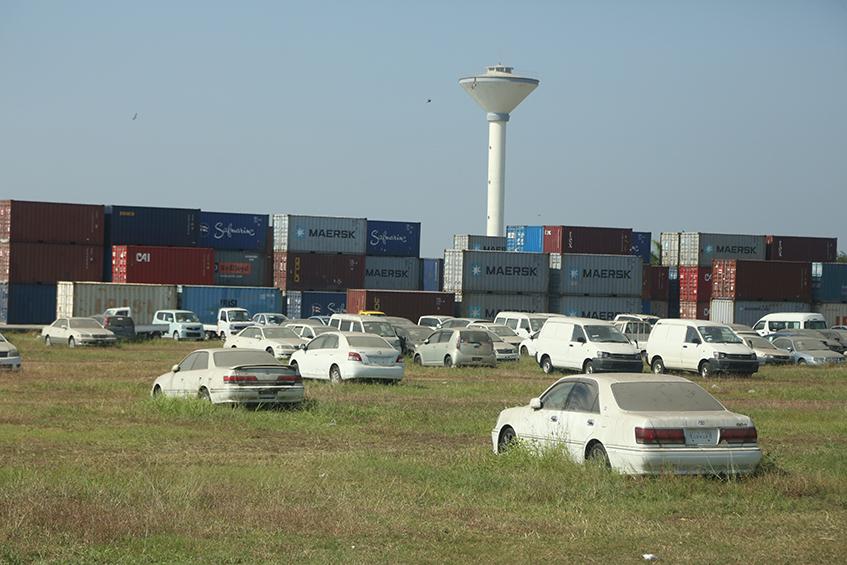
It must be looked into whether those that are eligible for the car permits can actually make use of them.
The first batch of government staff viable for the permits are those holding the ranks of director-general and above.
According to Dr Soe Tun, a motor vehicle businessman and chair of Myanmar Automobile Manufacturer and Distributor Association (MAMDA), there are around over 500 civil servants that are eligible for the first phase while in the second phase, there are thousands.
While the commerce ministry have announced the car permits to be so, there is still a lack of detailed information. The deputy commerce minister Aung Htoo had said during the Independence Day Ceremony in Nay Pyi Taw that the ministry will help government staff connect with the banks to make payments in installments.
As of now, the one with the highest salary in the public sector is the President.
Under Thein Sein’s government, it was legalized during the 2014-2015 fiscal year that the President will receive a salary of Ks 50 lakhs (5 million Kyats) as per extant law since the era of State Peace and Development Council.
The law states that vice-presidents will earn Ks 40 lakhs as well as two parliament speakers and chief justice are to earn Ks 35 lakhs. The Union Ministers, two parliament deputy speakers, state parliament speaker, regional chief ministers are to earn Ks 30 lakhs. Deputy Ministers, certain high ranking parliamentary and judicial positions are to earn Ks 20 lakhs.
Thus the annual income of the highest earner in the public sector, the president, is at 600 lakhs. As per law, the government also pays for expenses such as medical and clothing incurred by the president and vice-president’s immediate family members.
But as per NLD regulations that require members to donate a portion of their salary to the party, President Win Myint’s salary is at Ks 37 lakhs per month, Ks 450 lakhs per year. Since he was inaugurated on 30 March, 2018, his presidential term will come to one year and seven months at the end of January. His total income then would only be over Ks 700 lakhs.
According the rumors already circulating in the automobile market, Union Ministers and Chief Ministers are able to import, with those permits, cars worth Ks 1000 lakhs. The deputy ministers, state/regional ministers are eligible for those with Ks 700 lakhs while those below are eligible for automobiles worth Ks 500 lakhs.
So it must also be asked what sort of vehicles can an eligible person import because as it is now, the highest public sector income earner, the President, can only import vehicle worth up to Ks 700 lakhs (over USD 40,000).
A day after the news of car permits broke, there were already offers to buy those permits for Ks 500 Lakhs. Since then, the price has risen to Ks 700 Lakhs.
According to MAMDA’s chair Dr Soe Tun on his Facebook page, “Car permits with tax exemptions are coming soon for long-service civil servants. The tax collected for automobiles depend on engine power and such of the car and is worth around 100 to 150 percent of the original car value. For example, if the car costs Ks 300 lakhs, the tax in total will be around Ks 300-400 lakhs. So the permits will provide relief from that plus a Ks 100 lakhs more because it will not need ‘old car slip’ for Yangon Region. If the engine power exceed 1500cc, special taxes need to be paid too. In the first year, ownership name cannot be changed.”
The corruption-question for Aung Kyi
According to sources within the automobile market, there were a few that applied for the permit as soon as the car permit news broke.
A Union Minister enjoys Ks 30 lakhs and other privileges while a deputy minister earns Ks 20 lakhs plus other benefits. Union Ministers also already enjoy some tax reliefs and exemptions. Regional chief ministers get Ks 30 lakhs and there are some taxes applied to that but not for some other expenses.
Per year income for Union Ministers and regional chief ministers are at Ks 360 lakhs while one rank lower, deputy union ministers and state/regional level ministers earn Ks 240 lakhs. They will have to pay income tax for their salary.
The lowest-ranking position eligible for the first batch of the car permits are director-general(s). They earn monthly salary of Ks 5.5 lakhs per month, Ks 60 lakhs per year. They do not enjoy any other special privileges.
To summarize, the first batch of car permits will go to those that earn from Ks 10 to 50 lakhs.
In the second phase of the permits, any staff members are eligible as long as they meet the criteria. The positions can range from general assistance staff to director-generals. The lowest minimum wage earners in the public sector earn Ks 1.5 lakh while a DG earns Ks 5.5 lakh monthly.
According to the rumors, a DG can, through the permit, apply for an automobile worth Ks 500 lakhs.
As of now, the rising prices of consumer goods mean that public sector salary for a DG at 5.5 lakhs is not enough to support his or her family. If that is the case, it raises questions to those earning only that much to apply for cars. However, the same questions also apply if the President himself or even MPs apply for the permit.
MPs from both lower and upper house earn Ks 10 lakh per month. Regional level MPs earn Ks 5 lakh per month. Their annual income respectively is at Ks 96 lakh and 48 lakh.
Even then, there frequently are news that MPs from remote areas are struggling to pay for their travel expenses.
The announcement regarding permits from the commerce ministry, as of information available now while writing this article, may mean that MPs are eligible.
In laws regarding corruption, it is stated that the term ‘civil servant’ or government staff is all-encompassing whether if a certain individual was elected, promoted, whether salary is paid, permanent or temporarily employed. Even if it is the case that such individual is not directly employed in a government department, if an extant law proves that he or she is part of the public sector, then that individual is a civil servant.
In a situation when citizens from constituencies understand the hardships of their representative MP, it is starkly apparent if such an MP will suddenly want to apply for an expensive car through the permits. It will and must also be an important case to monitor in terms of corruption.
Chairman Aung Kyi from the Anti-Corruption Commission had always said that corruption in Myanmar is akin to a chronic disease. Other experts have also classified corruption in Myanmar as Systematic Corruption as it had attached itself to all limbs of the country for over 50 years.
Each successive government had vowed and tried to tackle corruption but had failed to not only stop but hasten the spread. Since civil servants themselves in authoritative and leadership roles had committed corruption, it had become corruption that is traditional in nature.
On December 6, 2018, Aung Kyi said at the Anti-Corruption Commission Forum that corruption has become an accepted practice as it had become widespread in social, economic, cultural and many other aspects.
He also said that since it had gone-on rampant for many decades, all people had lost hope that it can ever be stopped.
And so the matter of NLD’s new car permits must be watched as if it is a new leeway for corruption to occur.
Deputy commerce minister Aung Htoo said that motor vehicles can be imported with tax relief or exemption after the respective permanent secretary from each department’s ministry had signed approval for it.
One recent, relevant corruption investigation case is that of the ex-Chief Minister Dr Le Le Maw of the Tanintharyi Region. During the investigations, her usage of expensive automobiles was also looked into.
Chief Investigator Thant Zaw from the Anti-Corruption Commission (AAC) said that 112 civil servants were taken action against from between 2018 and 2019.
It was considered a low amount considering how for over 50 years corruption has gone unhindered in Myanmar.
Legal expert Nyo Nyo Thin says that the latest car permits is something to be paid attention to by the AAC.
“The commission must pay attention when there are assets around that exceeds their salary or there are attempts to do so. And it is not only the AAC that must watch because the AAC alone cannot do it. There are other departments and the country pays them salary so they will have to do it. It is all in the law. Even during the socialist era, if a civil servant have things that are deemed more than what that person can afford, the special investigation department can open a case. There already are laws. We have to use them,” said Nyo Nyo Thin.
There is also the issue, one of the major hindrances in the struggle against corruption, that those with political power will not divulge the full list of their assets publicly. The current situation is neither open nor transparent, which will be further compounded by the new car permits.
Around a year ago, Presidential Spokersperson Zaw Htay said that efforts are being undertaken with the AAC for politicians to disclose to private assets but it had sunk to the bottom of the swamp, never to be seen again at this point.
One such case where the assets of those in power were open to the public and shocked them was the case of Food and Drug Administration's ex-Director-General Dr Than Htut.
Officially, he was entitled to a Ks 5.5 lakh salary. But in 2017, he had squeezed out of a tender-winning company of home furniture and accessories, fencing of his privately owned land plots, building of a bungalow, a two-storied house including a garage, a gate house, swimming pool and a water sprinkler. All of the above cost the company in total over Ks 151 million.
Such past cases and the fact that those in power still cannot be transparent of their earnings mean that cars imported from the permits and whether those eligible can actually pay for those cars must be monitored.
Ultimately, it is the question of the year for AAC’s chief Aung Kyi to handle on resulting corruption that may follow; whether it’d be willing or unwillingly or any other forms of corruption.


